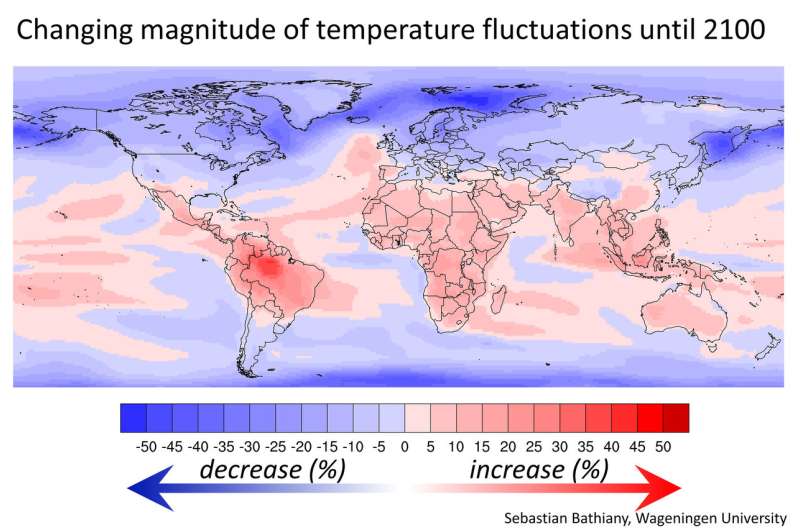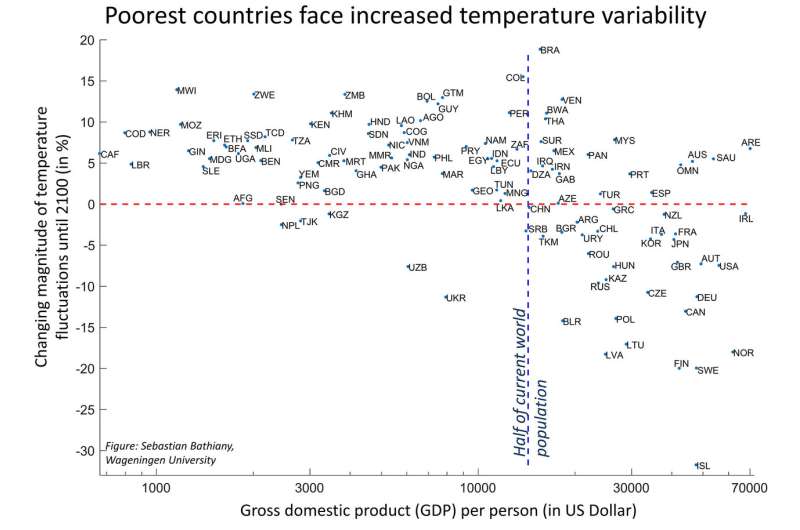May 3, 2018 report
Simulations suggest poor tropical regions likely to suffer more from global warming

A team of researchers from the Netherlands, France and the U.K. has found via simulation that poorer tropical regions are likely to suffer more than other areas from global warming. In their paper published on the open access site Science Advances, the group describes building their model and what it showed.
By now, it's well understood that the planet is warming due to greenhouse gases emitted into the atmosphere. But the ways by which it is heating up are still not well understood. One way, the new study suggests, is through changes in temperature variability—higher highs and lower lows, for example. In such scenarios, the researchers note, it is likely that some places will respond differently than others. The tropics are especially sensitive to such changes. This is because of the impact that moisture in the soil has on local temperatures. The researchers point out that a small increase in temperature could dry out the soil, which would result in an increase in local temperatures due to evaporation losses.
To get a better idea of which parts of the planet might be more impacted than others by temperature changes, the researchers ran 37 climate model simulations. But instead of using global mean temperature averages, they applied changes in standard deviation of monthly temperatures at the local scale. This allowed the simulations to factor in temperature variability across the globe when making predictions.
The researchers report that they saw the biggest impacts in places like the Amazon Basin, Southeast Asia, Australia and some parts of Africa. Such places are not only generally poorer than other countries, but are less responsible for causing the planet to overheat. Conversely, most of the highly developed countries are not likely to see such high variability—Australia was a noted exception.
If the tropics do experience more variability as the simulations show,resulting in drier soil, it could lead to trees dying. This would result in the release of CO2 into the atmosphere, making things even worse for everyone.

More information: Sebastian Bathiany et al. Climate models predict increasing temperature variability in poor countries, Science Advances (2018). DOI: 10.1126/sciadv.aar5809
Abstract
Extreme events such as heat waves are among the most challenging aspects of climate change for societies. We show that climate models consistently project increases in temperature variability in tropical countries over the coming decades, with the Amazon as a particular hotspot of concern. During the season with maximum insolation, temperature variability increases by ~15% per degree of global warming in Amazonia and Southern Africa and by up to 10%°C−1 in the Sahel, India, and Southeast Asia. Mechanisms include drying soils and shifts in atmospheric structure. Outside the tropics, temperature variability is projected to decrease on average because of a reduced meridional temperature gradient and sea-ice loss. The countries that have contributed least to climate change, and are most vulnerable to extreme events, are projected to experience the strongest increase in variability. These changes would therefore amplify the inequality associated with the impacts of a changing climate.
Journal information: Science Advances
© 2018 Phys.org



















